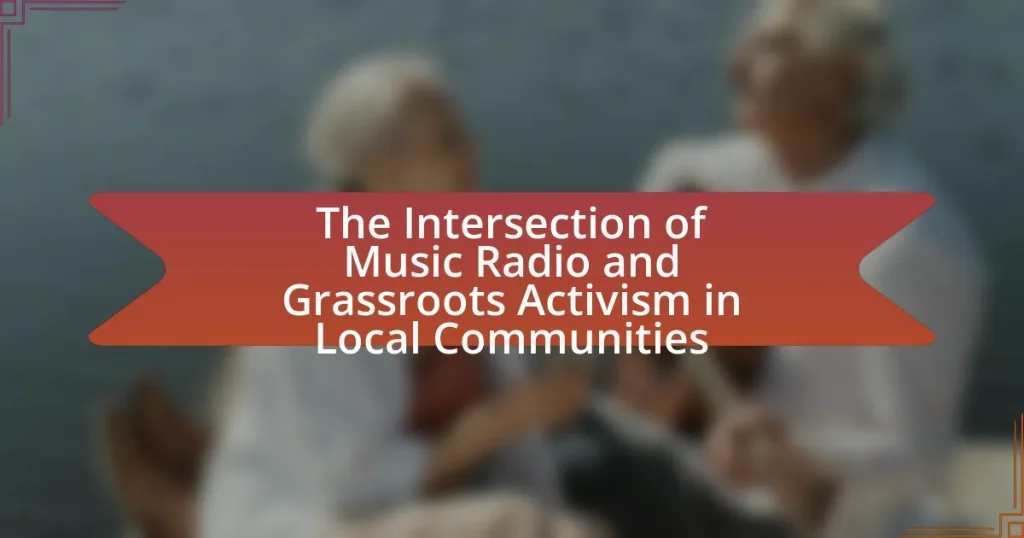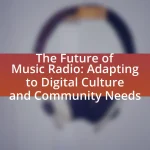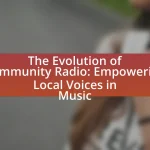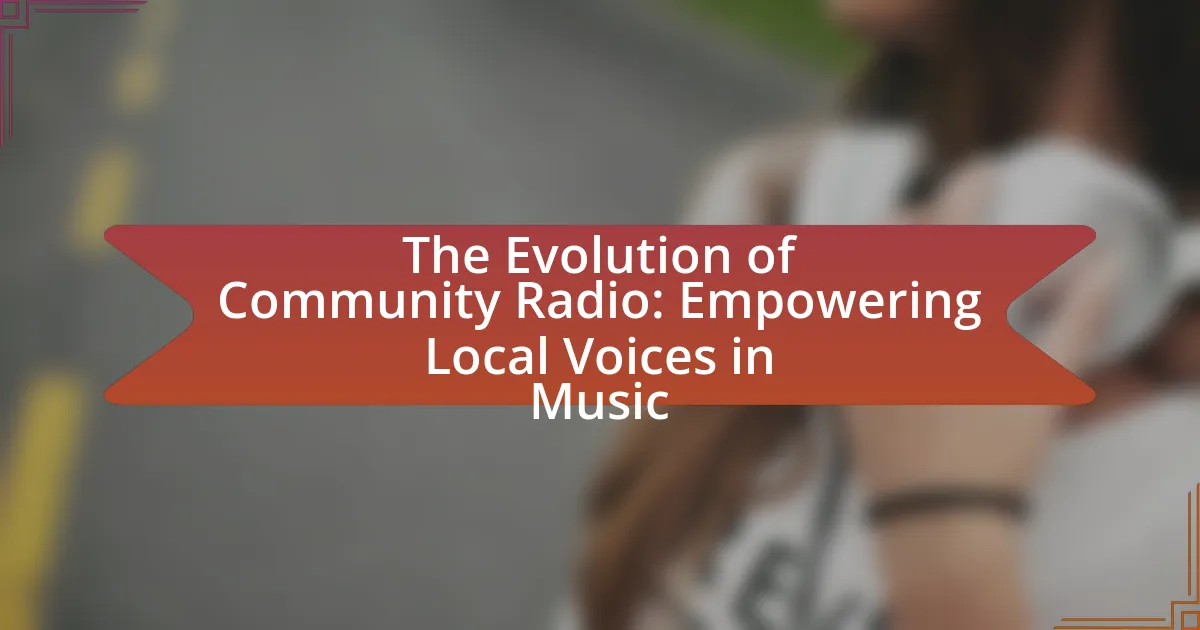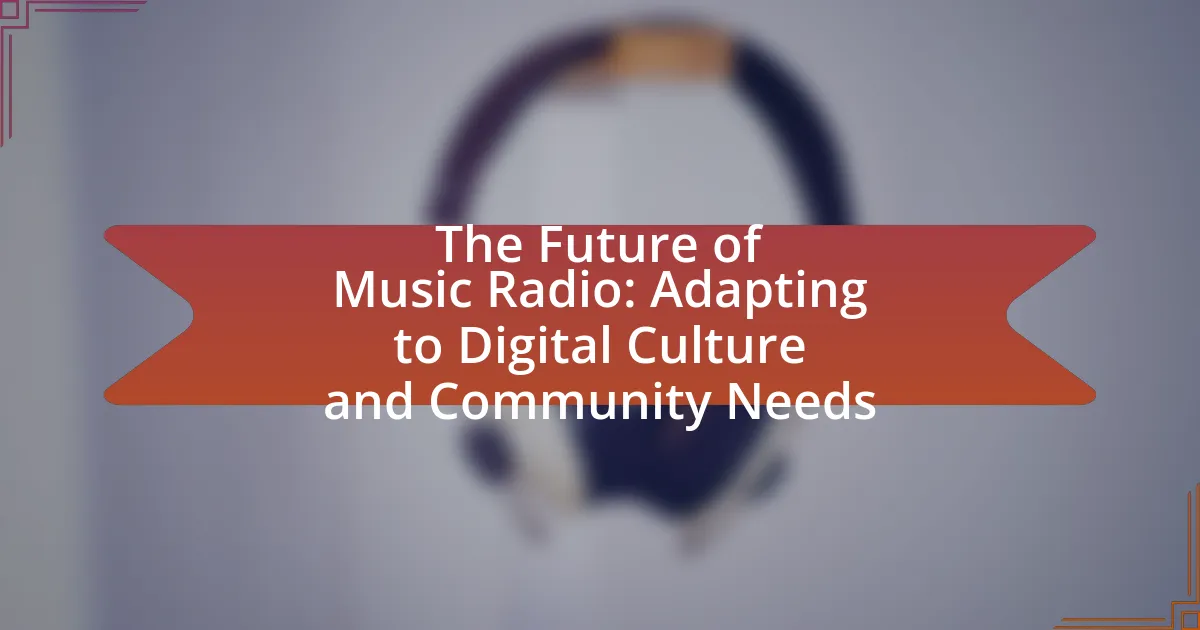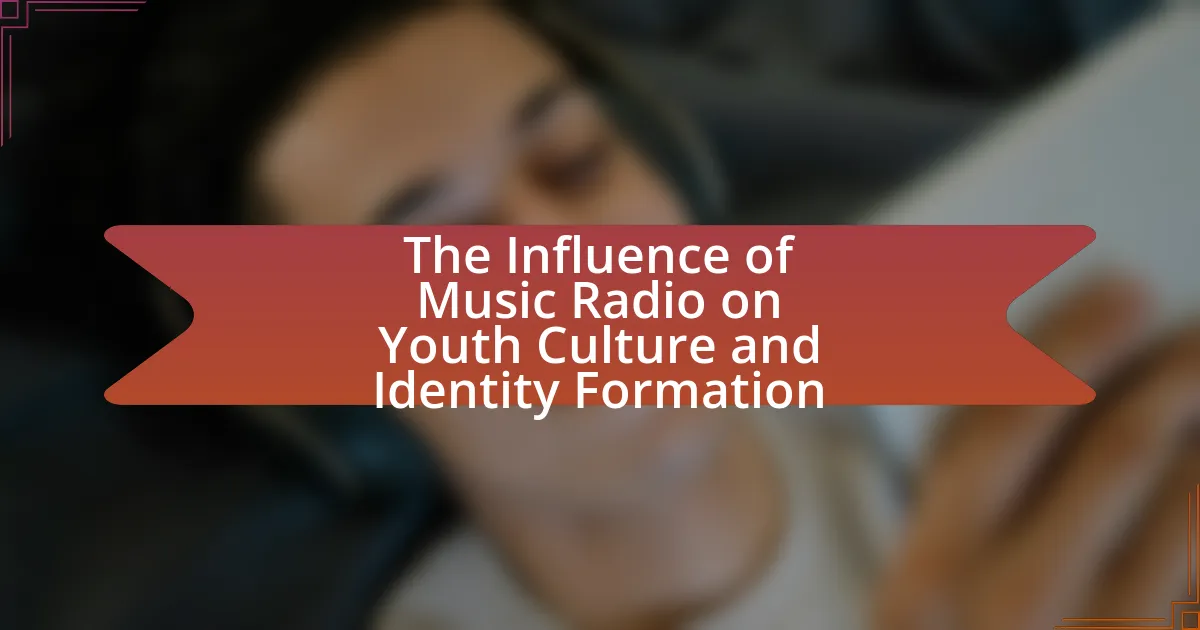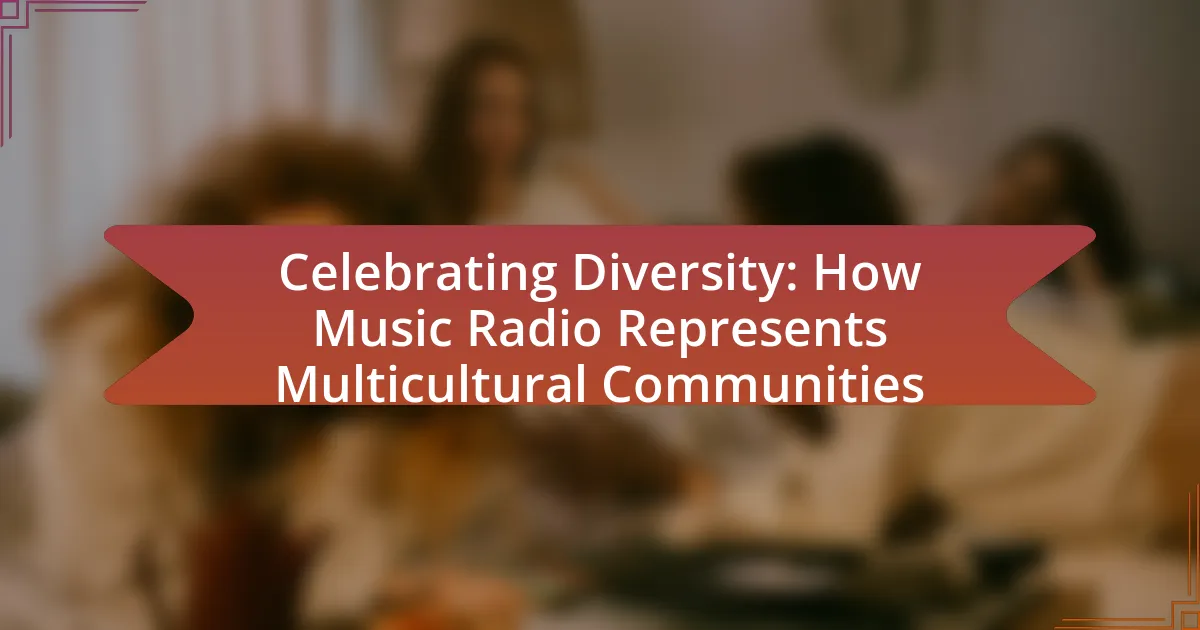The article examines the intersection of music radio and grassroots activism within local communities, highlighting how music radio serves as a platform for amplifying social justice issues and community voices. It discusses the role of local music radio stations in promoting community engagement, supporting local artists, and facilitating discussions on social issues. The article also explores the historical context of this relationship, the challenges faced by music radio and grassroots activism, and effective strategies for enhancing their collaboration. Key elements such as community engagement, diverse programming, and partnerships with local organizations are emphasized as vital for fostering activism and mobilizing support for social causes.
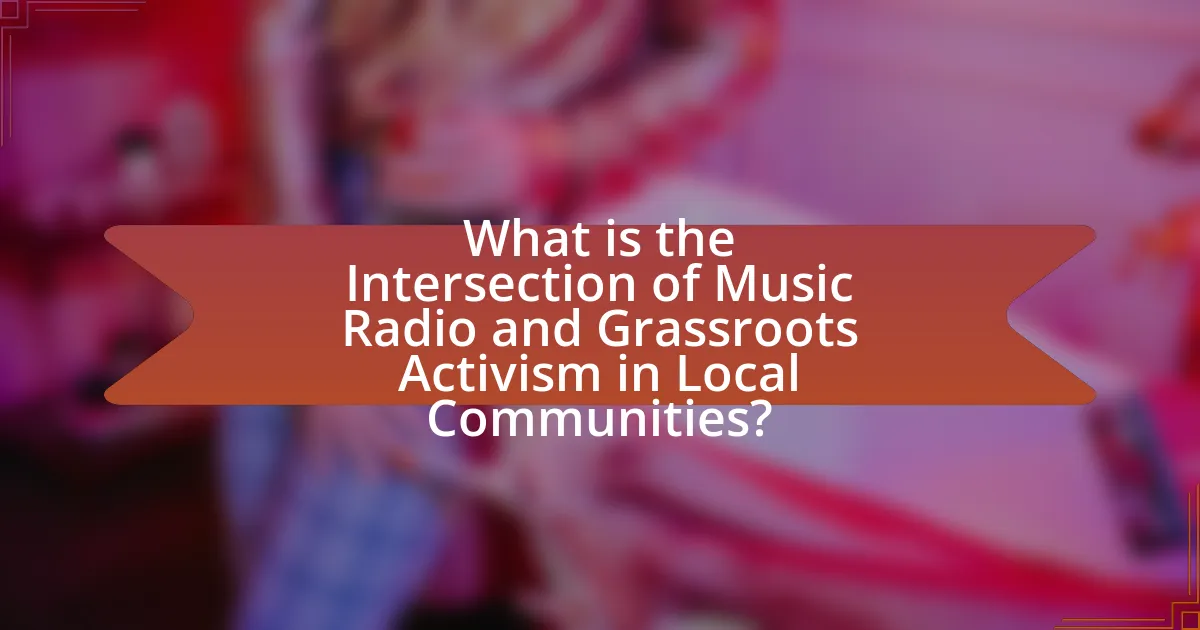
What is the Intersection of Music Radio and Grassroots Activism in Local Communities?
The intersection of music radio and grassroots activism in local communities is characterized by music radio serving as a platform for amplifying social justice issues and community voices. Music radio stations often curate playlists that reflect local culture and concerns, while also providing a space for activists to share information, promote events, and mobilize support. For instance, community radio stations like KPFA in Berkeley have historically played a crucial role in promoting civil rights and anti-war movements, demonstrating how music and activism can intertwine to foster community engagement and awareness. This synergy not only enhances the reach of grassroots movements but also empowers local artists and activists to connect with broader audiences, thereby reinforcing the impact of their initiatives.
How do music radio stations contribute to grassroots activism?
Music radio stations contribute to grassroots activism by providing a platform for local voices and issues, thereby amplifying community concerns and mobilizing listeners. They often feature programs that highlight social justice topics, promote local events, and interview activists, which raises awareness and encourages community engagement. For instance, stations like KPFA in Berkeley have a history of supporting civil rights movements and environmental causes, demonstrating their role in fostering activism. Additionally, music radio can serve as a rallying point for organizing protests and community gatherings, effectively bridging the gap between music culture and social movements.
What role do local music radio stations play in community engagement?
Local music radio stations serve as vital platforms for community engagement by promoting local artists, fostering cultural identity, and facilitating discussions on social issues. These stations often feature music from local musicians, which helps to strengthen community ties and support the local economy. For example, a study by the Pew Research Center found that 70% of listeners feel more connected to their community through local radio. Additionally, local music radio stations frequently host events, such as concerts and fundraisers, that encourage community participation and activism, further solidifying their role as community hubs.
How do music radio platforms amplify activist voices?
Music radio platforms amplify activist voices by providing a dedicated space for social and political issues to be discussed and promoted through music and dialogue. These platforms often feature programs that highlight the work of grassroots organizations, allowing activists to share their messages and mobilize support. For instance, community radio stations frequently host interviews with local activists, broadcast public service announcements, and curate playlists that reflect social justice themes, thereby reaching diverse audiences. Research indicates that community radio can significantly increase awareness and engagement in local activism, as evidenced by studies showing that listeners are more likely to participate in community events and advocacy efforts after exposure to relevant programming.
Why is the relationship between music radio and grassroots activism significant?
The relationship between music radio and grassroots activism is significant because music radio serves as a powerful platform for amplifying the voices and messages of grassroots movements. This connection enables local communities to disseminate information, raise awareness, and mobilize support for social causes. For instance, during the Civil Rights Movement, radio stations played a crucial role in broadcasting messages of equality and justice, helping to unify activists and inform the public. Additionally, studies have shown that community radio stations often prioritize local content, fostering a sense of belonging and encouraging civic engagement among listeners. This synergy between music radio and grassroots activism ultimately enhances community resilience and promotes social change.
What historical context supports this intersection?
The historical context that supports the intersection of music radio and grassroots activism in local communities is rooted in the civil rights movement of the 1960s. During this period, community radio stations emerged as vital platforms for marginalized voices, facilitating the dissemination of music that resonated with social justice themes. For instance, stations like WBAI in New York City played a crucial role in broadcasting protest songs and discussions that mobilized local activism. Additionally, the rise of genres such as folk and rock music, which often addressed political issues, further solidified the connection between music radio and grassroots movements, exemplified by artists like Bob Dylan and Joan Baez who used their music to inspire activism. This historical synergy illustrates how music radio has been instrumental in amplifying grassroots efforts and fostering community engagement.
How does this relationship impact local culture and identity?
The relationship between music radio and grassroots activism significantly shapes local culture and identity by amplifying community voices and fostering a sense of belonging. Music radio serves as a platform for grassroots activists to share their messages, promote local events, and highlight social issues, thereby influencing public discourse and cultural narratives. For instance, community radio stations often feature local artists and activists, creating a unique cultural identity that reflects the values and struggles of the community. This engagement not only preserves local traditions but also encourages collective action, as seen in movements like the Civil Rights Movement, where radio played a crucial role in mobilizing support and disseminating information.
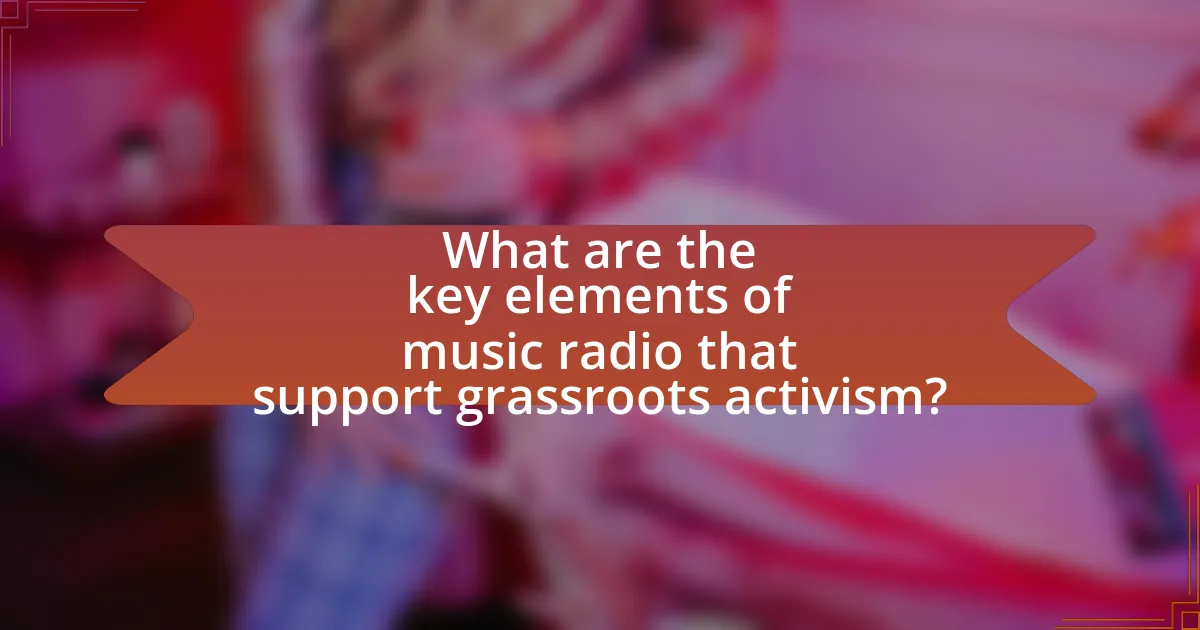
What are the key elements of music radio that support grassroots activism?
The key elements of music radio that support grassroots activism include community engagement, diverse programming, and accessibility. Community engagement allows local voices to be heard, fostering a sense of belonging and encouraging participation in social movements. Diverse programming showcases a variety of musical genres and cultural perspectives, which can raise awareness about social issues and inspire action. Accessibility ensures that the radio content reaches a wide audience, including marginalized groups, thereby amplifying their concerns and mobilizing support for grassroots initiatives. For instance, community radio stations often provide platforms for local activists to discuss issues relevant to their neighborhoods, effectively linking music with social change.
How do programming choices influence activism on music radio?
Programming choices significantly influence activism on music radio by determining which artists, genres, and messages are promoted, thereby shaping the discourse around social issues. For instance, radio stations that prioritize diverse and socially conscious music often provide a platform for marginalized voices, facilitating discussions on topics like racial justice and environmentalism. Research indicates that stations that feature local artists and community-focused content can enhance listener engagement and mobilize grassroots movements, as seen in the case of community radio stations that played pivotal roles during social movements in the 1960s and 1970s. By curating playlists that reflect activism, music radio can amplify calls for change and foster a sense of community among listeners.
What types of content are most effective for promoting activism?
Visual content, such as infographics and videos, is most effective for promoting activism. These formats capture attention quickly and convey complex information in an easily digestible manner. For instance, studies show that social media posts with images receive 94% more views than those without, highlighting the importance of visual engagement in activism. Additionally, storytelling through personal narratives in podcasts or radio segments fosters emotional connections, making the cause more relatable and motivating listeners to take action. Research indicates that emotional storytelling can increase audience engagement by up to 65%, demonstrating its effectiveness in driving activism.
How do music genres affect the message of grassroots movements?
Music genres significantly shape the message of grassroots movements by influencing the emotional resonance and cultural context of the activism. For instance, genres like hip-hop often address social justice issues, using powerful lyrics to articulate the struggles of marginalized communities, as seen in the works of artists like Kendrick Lamar, whose songs highlight systemic racism and inequality. In contrast, folk music has historically been associated with protest movements, such as the civil rights movement, where artists like Joan Baez used their music to promote peace and social change. The specific characteristics of each genre, including rhythm, instrumentation, and lyrical content, can enhance the relatability and urgency of the movement’s message, thereby mobilizing support and fostering community engagement.
What community engagement strategies do music radio stations employ?
Music radio stations employ various community engagement strategies, including local event sponsorship, listener participation initiatives, and partnerships with local organizations. These strategies enhance community connection and foster grassroots activism. For instance, many stations host live music events or community festivals, which not only promote local artists but also encourage community interaction and support. Additionally, listener participation initiatives, such as call-in shows or social media engagement, allow audiences to share their opinions and experiences, creating a sense of ownership and involvement. Partnerships with local nonprofits or advocacy groups further amplify the station’s impact by addressing community issues and promoting social causes, thereby reinforcing the station’s role as a community hub.
How do partnerships with local organizations enhance activism?
Partnerships with local organizations enhance activism by leveraging community resources and networks to amplify outreach and engagement. These collaborations enable activists to tap into established trust and credibility within the community, which can lead to increased participation in initiatives. For instance, a study by the National Civic League found that community-based partnerships can improve civic engagement by 30%, demonstrating the effectiveness of localized efforts in mobilizing support for social causes. Additionally, local organizations often possess valuable insights into the specific needs and concerns of the community, allowing activists to tailor their strategies for greater impact.
What events or campaigns are commonly supported by music radio?
Music radio commonly supports events and campaigns focused on social justice, community development, and local cultural initiatives. These include charity concerts, awareness campaigns for health issues, and local festivals that promote regional artists. For instance, many music radio stations participate in fundraising events for causes like cancer research or disaster relief, leveraging their platform to raise awareness and funds. Additionally, music radio often collaborates with grassroots organizations to amplify messages related to civil rights and environmental sustainability, demonstrating their role in fostering community engagement and activism.
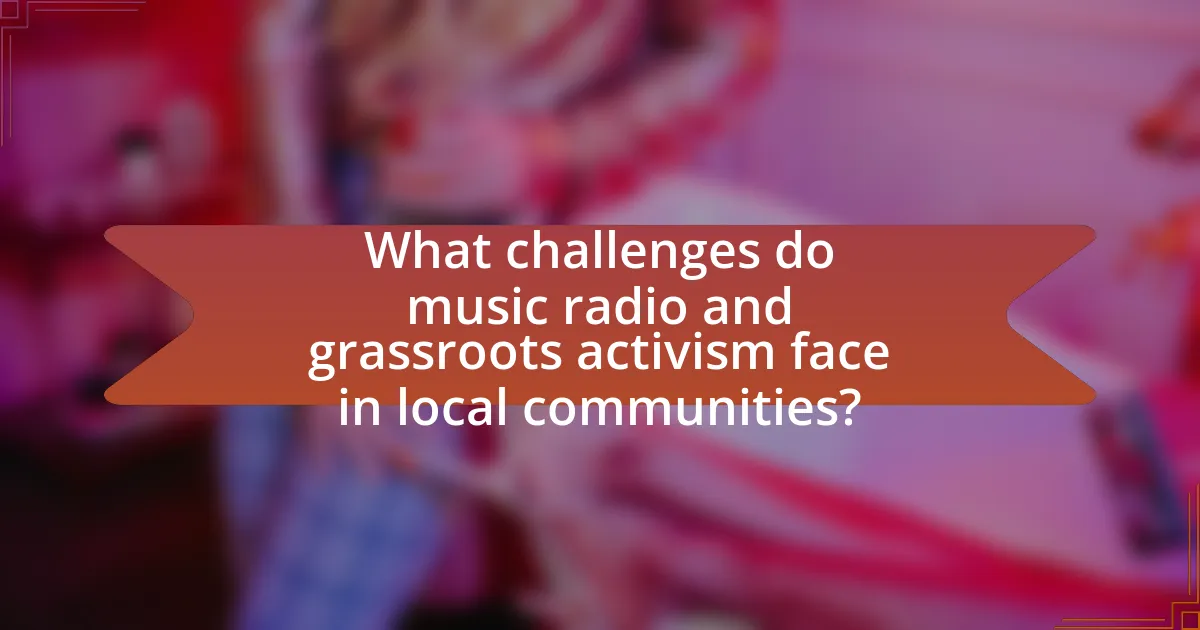
What challenges do music radio and grassroots activism face in local communities?
Music radio and grassroots activism face significant challenges in local communities, primarily due to funding limitations and regulatory constraints. Music radio stations often struggle with financial sustainability, as advertising revenue has declined with the rise of digital platforms, leading to reduced programming diversity. Grassroots activism encounters obstacles such as limited access to resources and media coverage, which hampers their ability to mobilize support effectively. Additionally, both music radio and grassroots movements face regulatory hurdles, including licensing issues and restrictions on content that can stifle their outreach efforts. These challenges collectively hinder their potential to foster community engagement and promote social change.
How do funding and resources impact music radio’s activism efforts?
Funding and resources significantly enhance music radio’s activism efforts by providing the necessary financial support and tools for outreach and engagement. Adequate funding allows music radio stations to invest in programming that addresses social issues, host community events, and collaborate with local organizations. For instance, stations with robust financial backing can produce high-quality content that raises awareness about critical topics such as racial justice or environmental concerns, thereby amplifying grassroots movements. Research indicates that community radio stations with stable funding are more likely to engage in activism, as they can allocate resources for training volunteers, acquiring equipment, and reaching broader audiences through marketing initiatives. This correlation between funding and activism effectiveness underscores the importance of financial support in empowering music radio to serve as a platform for social change.
What are the barriers to entry for grassroots activists in local radio?
Barriers to entry for grassroots activists in local radio include limited access to funding, regulatory challenges, and lack of technical expertise. Funding constraints often prevent activists from securing necessary resources for equipment and operational costs, as many grassroots initiatives operate on tight budgets. Regulatory challenges arise from complex licensing requirements imposed by government agencies, which can be difficult for newcomers to navigate. Additionally, the lack of technical expertise in broadcasting and production can hinder activists from effectively creating and disseminating their messages, as they may not have the skills or knowledge to operate radio equipment or software. These factors collectively create significant obstacles for grassroots activists seeking to engage with local radio as a platform for their initiatives.
How does regulatory pressure affect music radio’s ability to support activism?
Regulatory pressure significantly limits music radio’s ability to support activism by imposing restrictions on content and programming. These regulations can include censorship laws, licensing requirements, and restrictions on political speech, which hinder radio stations from freely promoting activist messages or controversial topics. For instance, the Federal Communications Commission (FCC) in the United States enforces rules that can penalize stations for airing content deemed inappropriate or politically biased, thus discouraging them from engaging in activism. This regulatory environment creates a climate of fear among radio operators, leading to self-censorship and a reduced capacity to amplify grassroots movements effectively.
What strategies can be employed to overcome these challenges?
To overcome challenges at the intersection of music radio and grassroots activism in local communities, strategies such as fostering collaboration between local artists and activists can be employed. This collaboration can amplify community messages and increase engagement, as evidenced by initiatives like the “Community Radio for Social Change” project, which demonstrated that local music can effectively raise awareness about social issues. Additionally, leveraging social media platforms to promote radio content can enhance outreach and participation, as studies show that 70% of community radio listeners engage with content shared on social media. Implementing training programs for community members on media production can also empower grassroots activists, enabling them to create their own content and share their narratives effectively.
How can community members support local music radio initiatives?
Community members can support local music radio initiatives by actively participating in fundraising efforts and volunteering their time. Engaging in fundraising activities, such as organizing events or contributing financially, directly enhances the station’s resources, enabling it to operate and expand its programming. Volunteering for tasks like event coordination, on-air hosting, or administrative support fosters a sense of ownership and community involvement, which is crucial for the sustainability of local radio. According to a study by the National Federation of Community Broadcasters, community involvement significantly increases listener engagement and station viability, demonstrating the impact of local support on the success of music radio initiatives.
What best practices can enhance the effectiveness of music radio in activism?
To enhance the effectiveness of music radio in activism, stations should prioritize community engagement, curate relevant content, and leverage social media platforms. Community engagement fosters a sense of ownership and connection, allowing listeners to participate in discussions and initiatives that matter to them. Curating content that aligns with local issues and social movements ensures that the programming resonates with the audience, making it more impactful. Additionally, leveraging social media platforms amplifies the reach of messages, enabling real-time interaction and mobilization of listeners for activism efforts. Research indicates that community-driven radio stations can increase civic participation by up to 30%, demonstrating the tangible benefits of these best practices.
What practical steps can local communities take to leverage music radio for activism?
Local communities can leverage music radio for activism by creating dedicated programming that highlights social issues and promotes community engagement. This can include hosting interviews with local activists, broadcasting discussions on relevant topics, and featuring music that resonates with the community’s struggles and aspirations.
Additionally, communities can organize events such as live performances or radio-a-thons that raise awareness and funds for specific causes. Collaborating with local artists to produce original content that addresses social justice themes can further amplify the message.
Research indicates that community radio stations can significantly influence public opinion and mobilize grassroots movements, as evidenced by the success of stations like KPFA in Berkeley, which has a history of supporting civil rights and anti-war movements. By actively involving listeners in the programming process, communities can foster a sense of ownership and encourage participation in activism.
